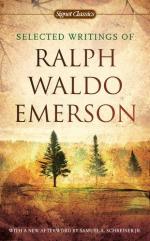
|
| Name: _________________________ | Period: ___________________ |
This test consists of 15 multiple choice questions and 5 short answer questions.
Multiple Choice Questions
1. Whose principles, which led to a new age in quantum physics, are similar to the ideas hinted at in "Circles"?
(a) Robert Oppenheimer's.
(b) Albert Einstein's.
(c) Gabriele Veneziano's.
(d) Leonard Hofstadter's.
2. What is the function of art, according to Emerson?
(a) To open our eyes.
(b) To prompt discussions about art.
(c) To reveal inner thoughts of the artist.
(d) To raise controversies.
3. What philosopher did Emerson say was the beginning and end of all philosophy?
(a) Socrates.
(b) Plato.
(c) Confucius.
(d) Immanuel Kant.
4. How does Emerson suggest his readers should acquire art?
(a) By listening to art dealers.
(b) By reading about what's popular at the time.
(c) By following their hearts.
(d) By creating it themselves.
5. According to Emerson, what do realists have on their side?
(a) Faith.
(b) Emotion.
(c) Reason.
(d) Heart.
6. Why does Emerson say every man is not duplicitous for not only being partialist?
(a) He really is only a partialist, except when in conversation with other philosophers.
(b) He can move between viewpoints, but is not both simultaneously.
(c) Emerson says men are duplicitous.
(d) It is simply the way the human mind works.
7. According to Emerson, every man is both ______ and partialist.
(a) Universalist.
(b) Spiritualist.
(c) Humanist.
(d) Pantheist.
8. To whom does Emerson attribute the term "transcendentalism"?
(a) The Buddha.
(b) Henry David Thoreau.
(c) Immanuel Kant.
(d) President Abraham Lincoln.
9. Who or what is a part of nature, according to "Nature"?
(a) Philosophy.
(b) Man.
(c) Architecture.
(d) Progress.
10. At what college did Emerson give "The American Scholar" as an address?
(a) New York University.
(b) Harvard.
(c) Princeton.
(d) Oxford.
11. Who sees through appearances and trends to seize life and speak truth?
(a) The academic.
(b) The philosopher.
(c) The artist.
(d) The poet.
12. What is another phrase for the over-soul, according to Emerson?
(a) The innocence of childhood faith.
(b) Universal consciousness.
(c) A manifestation of God.
(d) The true being.
13. How are eccentricities dealt with in people who are otherwise fit to enter a mannered upper class?
(a) They become ammunition for expulsion from that upper class.
(b) They become a matter of amusement.
(c) They are molded into good manners.
(d) They are politely ignored.
14. What is the ultimate effect of two lovers drawing closer to each other spiritually?
(a) Drawing closer to each other emotionally.
(b) Drawing closer to each other physically.
(c) Drawing closer to God.
(d) Understanding each other on an intellectual level.
15. What view does Emerson take of human love in "Love"?
(a) Spiritual.
(b) Logical.
(c) Physical.
(d) Emotional.
Short Answer Questions
1. The power of ______ lies in their ability to awaken us to the universal and timeless laws of man and nature.
2. According to Emerson, heroism is the unwavering determination to do the right thing combined with a supremely ______.
3. What is the only permanent thing in the universe, according to Emerson?
4. What does Emerson say people hope to have happen to old patterns?
5. What does true friendship require, according to Emerson?
|
This section contains 482 words (approx. 2 pages at 300 words per page) |

|




